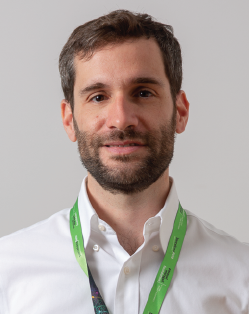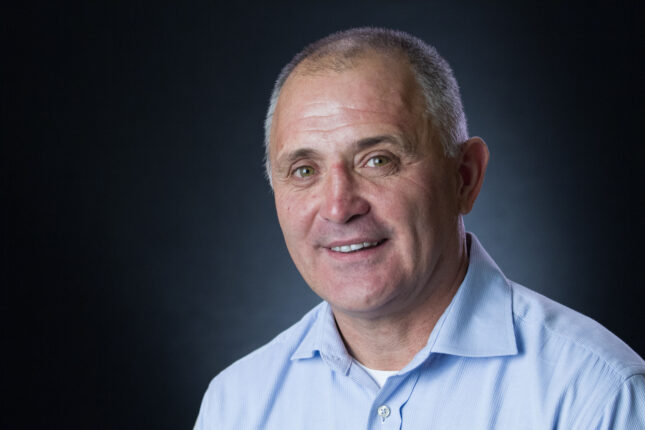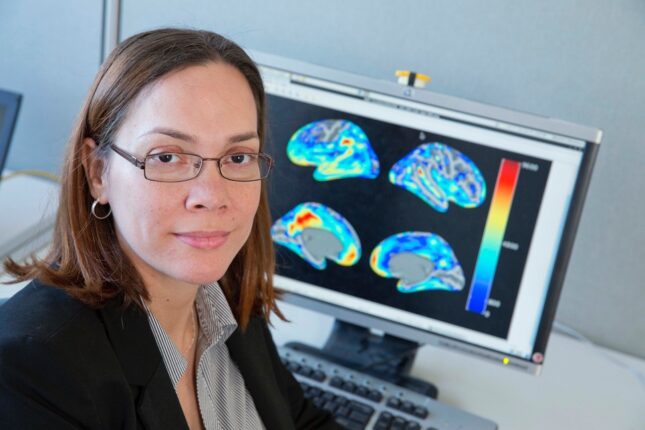DIAN Target Validation Symposium Featured Speakers
Featured Speakers- In Order of Presentations
Eric Karran, PhD
Topic: Primers on Target Validation

Dr. Eric Karran is a molecular biochemist by training. He joined AbbVie in 2015 originally to lead the Foundational Neuroscience Center in Cambridge, Massachusetts, and then assumed leadership of AbbVie’s Neuroscience Discovery Research team with sites in Cambridge, Lake County, Illinois and Ludwigshafen, Germany. Previously Eric was the Director of Research for Alzheimer’s Research UK, in which role he founded three Drug Discovery Institutes in the Universities of Cambridge, Oxford and University College London. He has held senior Neuroscience leadership positions at GSK, Pfizer, Eli Lilly and at Johnson and Johnson. Eric is an Adjunct Professor in the Department of Molecular Neuroscience at the Institute of Neurology, University College London.
Geoffrey Kerchner, MD, PhD
Topic: Primers on Target Validation

Geoffrey A. Kerchner, MD, PhD is a neurologist and neuroscientist serving as Vice President and Global Head of Early Development in Neuroscience and Rare Diseases at F. Hoffmann-La Roche, Ltd., in Basel, Switzerland. He graduated summa cum laude from Harvard University and completed MD and PhD degrees at Washington University School of Medicine. Dr. Kerchner completed residency at the University of California, San Francisco, where he went on to complete a postdoctoral fellowship in neuroscience and a clinical fellowship in behavioral neurology. In 2009, he became an Assistant Professor of Neurology and Neurological Sciences at Stanford University School of Medicine, where he saw patients in a memory clinic, ran an NIH-funded neuroimaging laboratory, and was site principal investigator for industry-sponsored clinical trials in Alzheimer’s disease. He joined Genentech and Roche in 2015, where he led Phase I, II, and III clinical development teams before taking on his current role
Lucia Chavez-Gutierrez, PhD
Topic: Known Amyloid Target Validations

Lucía Chávez-Gutiérrez (LCG) holds a PhD in Sciences with a major in Biochemistry from the National University of Mexico. Trained as an enzymologist with a strong background in structural biology, LCG explores proteolytic mechanisms and their (dys) regulation, under the premise that developing a solid mechanistic understanding of these processes will offer critical insights into how proteolytic switches control fundamental processes in physiology and disease.
Her fascination for proteases motivated her postdoctoral studies on γ-secretase intramembrane proteases in the laboratory of Bart De Strooper at the VIB-KU Leuven Center for Brain and Disease Research, Belgium. LCG’s studies on γ-secretase proteases and their pathogenic involvement in the familial form of Alzheimer‘s disease (AD) settled down a long-standing “loss-of-function vs. gain-of-function” debate on familial AD etiology (Chávez-Gutiérrez et al, EMBO 2012; Szaruga et al, JEM 2015 and Veugelen et al, Neuron 2016). In this work, she demonstrated that disease-linked mutations in Presenilin (catalytic subunit of the γ-secretase) and the amyloid precursor protein (APP) have no consistent inhibitory effects on the global activity of the protease-that controls key signalling cascades- but invariably lead to enhanced generation of longerand amyloidogenic Aβ peptides from APP.
Her recent mechanistic work depicts γ-secretases as metastable structures and AD-linked mutations as destabilizing variants that weaken γ-secretase and APP (enzyme and substrate) interactions during proteolysis and thereby lead to enhanced generation of amyloidogenic Aβs (Szaruga et al, Cell 2017). These findings place Aβ at the core of ADpathogenesis and importantly, put forward a novel model for the sporadic and most common form of Alzheimer‘s disease, in which environmental factors (potentially linked to aging, diet or life style) modulating the stability of γ-secretase/APP interactions alter the risk for AD.
LCG lives in Belgium with her husband and two children. She is group leader at the VIB Center for Brain and Disease Research and Assistant Professor at the University of Leuven.
Jasmeer Chhatwal, MD, PhD
Topic: Known Amyloid Target Validators

Dr. Chhatwal is an Associate Professor of Neurology at Harvard Medical School, and a clinician-scientist based at Massachusetts General Hospital (MGH) and Brigham and Women’s Hospitals (BWH). He cares for patients with neurodegenerative diseases in the Memory Disorders Unit at MGH, with a particular focus on early-onset and genetically-driven Alzheimer’s disease. He has a diverse scientific and educational background that spans molecular, cellular, and systems neuroscience and his research program includes projects in neuroimaging, electrophysiology, biochemistry, molecular biology, genetics, and machine learning. Supported by the NIH and the Doris Duke Charitable Foundation, Dr. Chhatwal leads research on vascular, sleep-related, and inflammatory influences on late life cognitive decline and the accumulation of Alzheimer’s disease pathology. He is a site and project leader for the Dominantly Inherited Alzheimer Network (DIAN) observational study, is a member of the therapeutics evaluation committee for the DIAN Treatment Unit, and leads research examining the mechanisms that underlie disease heterogeneity in autosomal dominant and sporadic Alzheimer’s disease. He directs the Biomarkers of Neurodegeneration, Inflammation, and Cognitive Decline (BioNIC) laboratory at BWH and MGH. The BioNIC laboratory brings together neuroimaging, clinical, and biochemical experts on Alzheimer’s disease with the goal of developing new biomarkers that elucidate disease mechanisms, identify key drug targets, and accelerate the testing of novel therapies.
Nicolas Barthélemy, PhD
Topic: Known Tau Target Validation

Nicolas Barthélemy, PhD, is Assistant Professor of Neurology at Washington University in St Louis School of Medicine. Dr Barthélemy obtained is PhD in analytical chemistry from the University of Strasbourg, France. He has focused his research on the development of mass spectrometry based assays monitoring tau protein modifications including phosphorylation in biofluids and their assessment as biomarkers for the diagnostic of tauopathies. His work has notably contributed to identify ptau217 phosphorylation in spinal fluid and plasma as a highly sensitive target to detect tau pathological changes associated to early brain amyloid deposition in Alzheimer disease.
Oskar Hansson, MD, PhD
Topic: Known Tau Target Validations

Dr. Oskar Hansson gained his PhD in neurobiology in 2001 and his M.D. in 2005. He became senior consultant in neurology in 2012 at Skåne University Hospital and full professor of neurology in 2017 at Lund University, Sweden. Oskar Hansson performs internationally recognized clinical and translational research focusing on the early phases of Alzheimer’s and Parkinson’s diseases. His work on biomarkers has led to over 400 original peer-reviewed publications. He heads the prospective and longitudinal Swedish BioFINDER studies (www.biofinder.se), where the research team focuses on the development of optimized diagnostic algorithms for early diagnosis, and studies the consequences of different brain pathologies on cognitive, neurologic and psychiatric symptoms in healthy individuals and patients with dementia and parkinsonian disorders. Recently, the BioFINDER team has shown that Tau PET imaging can with high accuracy distinguish Alzheimer’s from all other neurodegenerative diseases (JAMA, 2018), predict cognitive decline in cognitively normal individuals (Nature Medicine, 2022), and to detect different subtypes of Alzheimer’s (Nature Medicine 2021). He has also developed and validated blood-based biomarkers for early detection of Alzheimer’s disease (Nature Medicine, 2020; JAMA, 2020, Nature Aging 2021, Nature Medicine 2021, Nature Medicine 2022). He is the co-director of the strategic research area of neuroscience at Lund University, and responsible for research at the Memory Clinic at Skåne University Hospital.
Erik Johnson, MD, PhD
Topic: Potential Omics Target Validation

Dr. Johnson is currently an Assistant Professor in the Department of Neurology, and a member of the Goizueta Alzheimer’s Disease Research Center and Center for Neurodegenerative Diseases at Emory University. He is a cognitive neurologist with an active clinical practice who sees patients with Alzheimer’s disease and other cognitive disorders. Dr. Johnson received a Ph.D. in Biochemistry and an M.D. from the University of Chicago, after which he did his neurology residency training at the University of California-San Francisco, and a fellowship at the UCSF Memory and Aging Center and the Gladstone Institutes. His research interests focus on using proteomics to develop fluid molecular biomarkers for Alzheimer’s disease.
Celeste Karch, PhD
Topic: Potential Omics Target Validation

Dr. Karch is a Professor of Psychiatry at Washington University School of Medicine. The goal of the Karch lab is to understand the molecular drivers of Alzheimer’s disease, frontotemporal dementia, and other neurodegenerative disease. To do this, the Karch lab uses functional genomics alongside stem cell and mouse models. The Karch lab has developed a somatic and stem cell collection containing deeply clinically characterized cell lines from individuals carrying genetic drivers of Alzheimer’s disease, frontotemporal dementia, amyotrophic lateral sclerosis and Parkinson’s disease. These cells are used to develop novel tools to interrogate mechanisms of neurodegenerative disease. Additionally, the Karch lab couples high-throughput transcriptomics and proteomics in stem cells and human brain tissues to identify disease signatures and to understand protein kinetics in disease. Dr. Karch is the Knight ADRC Biomarker Core leader and the Scientific Director of the Dominantly Inherited Alzheimer Network (DIAN). In 2021, she was awarded the Rainwater Prize for Innovative Early Career Scientist.
Charlotte Teunissen, PhD
Topic: Biomarkers for non-Amyloid/non-Tau Target Validations

Dr. Charlotte Teunissen (full professor in Neurochemistry) aims to improve care of patients with neurological diseases by developing body fluid biomarkers for diagnosis, stratification, prognosis and monitoring treatment responses. Studies of her research group span the entire spectrum of biomarker development, starting with biomarker identification, followed by assay development and validation, and extensive clinical validation to ultimately implement novel biomarkers in clinical practice.
She is responsible for the Alzheimer Center Amsterdam body fluid and leads several international biomarker networks, such as the CSF Society and the Alzheimer Association-Global Biomarker Standardization consortium, and the recently founded Coral proteomics consortium. She is the coordinator of the Marie Curie MIRIADE project, aiming to train 15 novel researchers into accelerate dementia biomarker development
Marc Suárez-Calvet, MD, PhD
Topic: Biomarkers for non-Amyloid/non-Tau Target Validations

Marc Suárez-Calvet MD PhD is a clinical neurologist with expertise in Alzheimer’s disease and other neurodegenerative diseases. He is the Group Leader of the Fluid Biomarkers and Translational Neurology Research Group at Barcelonaβeta Brain Research Center and at the Neurology Department of Hospital del Mar (Barcelona, Spain). He has been awarded with the prestigious European Research Council (ERC) Starting Grant to study blood proteins that have an ageing and rejuvenating effect on the brain. His current research also focuses in blood biomarkers and his studies have been published in journals such as Nature Medicine, JAMA Neurology or Neurology.
After obtaining his medical degree at Universitat Autònoma de Barcelona (2004), he completed the residency in Neurology at Hospital de la Santa Creu i Sant Pau (2009), and a research fellowship at Harvard University. From 2012 to 2017 he worked as a researcher at Prof Christian Haass Lab at Ludwig-Maximilians Universität and the Deutsches Zentrum für Neurodegenerative Erkrankungen (Munich, Germany), where he led two very translational projects. First, he described the first post-translational modification specifically associated with FTLD-FUS, namely monomethylated arginine (MMA) FUS. Second, he initiated a biomarker project involving the measurement of sTREM2 (a microglial biomarker). In 2017, he was also an honorary clinical assistant in the Dementia Research Center in the National Hospital for Neurology and Neurosurgery (UCLH), London (UK), under the supervision of Prof Nick Fox.
In 2018, he joined the Barcelonaβeta Brain Research Center (BBRC) and combines his research activity with a clinical appointment in Hospital del Mar. He was awarded with the “Alzheimer Prize 2021” from the Spanish Society for Neurology.
Lynn D. Kramer, MD, FAAN
Topic: Clinical/Cognitive Validation of Targets

Lynn D. Kramer, MD, FAAN, is Chief Clinical Officer, ADBH (Alzheimer’s Disease & Brain Health) at Eisai and a member of the Eisai Company Ltd. Executive Committee. In these roles, he oversees the product creation cycle including clinical introduction, and regulatory approval of innovative projects in the neuroscience and general medicine area globally. He recently received the 2022 Epilepsy Foundation Lifetime Accelerator Award.
Dr. Kramer, who has been with Eisai since 2007, started as the Executive Vice President of Global Clinical Research, and was soon promoted to the additional role of Chief Operating Officer of Eisai Medical Research. In early 2009, he was named President of the Scientific and Operational Clinical Support Core Function Unit (SOCS CFU) and President of the Neuroscience, Product Creation Unit. He was named Chief Clinical Officer and a member of the Executive Committee, Eisai Company, Ltd. in 2012. In these functions he has been responsible for all functions including regulatory, biostatistics, data management, medical writing\, clinical functions and clinical pharmacology and modeling and simulations. During this time he has overseen the development and approval of a number of NME’s including Leqembi.
Earlier in his career he held senior positions in drug development such as Vice President Clinical Research and Head of the Therapeutic Area Strategy Team at Novartis, and Vice President Clinical Research at the R.W. Johnson Pharmaceutical Research Institute.
Dr. Kramer is a Fellow of the American Board of Psychiatry and Neurology (1987) and the Philadelphia College of Physicians (1987). He previously served as the industry representative on the Peripheral and Central Nervous System Drugs Advisory Committee of the Food and Drug Administration (FDA) and on the Board of Directors at American Society for Experimental Neuro Therapeutics (ASENT). He currently is a member of the Pharma R & D Leadership Forum.
Dr. Kramer received his MD from Hahnemann Medical College. He completed his internship in internal medicine at the University of California at Irvine, and his residency in neurology at the University
Paul Maruff, PhD
Topic: Clinical and Cognitive Validations of Targets

Paul Maruff, PhD is a neuropsychologist with expertise in the design, development and application of assessments of cognition in clinical trials of central nervous system active drugs. He is Chief Innovation Officer at Cogstate, Ltd and Professor at the Alzheimer’s Disease Research Group at the Florey Institute for Neuroscience at the University of Melbourne, Australia. Paul has worked in the pharmaceutical industry for 20 years, with the focus of that work being the use of cognition to guide decisions about the safety and efficacy of experimental and licensed compounds.
Yakeel Quiroz, PhD
Topic: Protective/ Escapee

Yakeel Quiroz is an associate professor in the departments of psychiatry and neurology at Massachusetts General Hospital and Harvard Medical School. She currently serves as director of the MGH Familial Dementia Neuroimaging Lab and the Multicultural Alzheimer’s Prevention Program. Her research interests include brain imaging, genomics, and biomarkers of Alzheimer’s disease and other dementias.
Quiroz is principal investigator on the COLBOS (COLombia-BOSton) biomarker study that follows individuals from the world’s largest extended family with a single, Alzheimer’s-causing mutation (E280A in Presenilin1).
Under the auspices of her COLBOS study, Quiroz’s team assessed a mutation carrier from the Colombian kindred who remained resistant to Alzheimer’s dementia for nearly 30 years after her estimated age at clinical onset. She had two copies of a rare APOE variant (i.e., APOE3 Christchurch mutation) that have been linked to her protection against Alzheimer’s disease.
Quiroz has been recognized broadly for her research, including with the NIH Director’s Early Independence Award, an MGH Research Scholar Award and the Alzheimer’s Association’s Inge Grundke-Iqbal Award for Alzheimer’s Research.
Randall Bateman, MD
Topic: Disease Modification

Randall Bateman, MD Charles F. and Joanne Knight Distinguished Professor of Neurology Director and Principal Investigator of the Dominantly Inherited Alzheimer Network (DIAN) and the Dominantly Inherited Alzheimer Network Trials Unit (DIAN-TU) Washington University School of Medicine
Randall Bateman, MD is the Charles F. and Joanne Knight Distinguished Professor of Neurology, Director of the Dominantly Inherited Alzheimer Network (DIAN), and Director of the DIAN Trials Unit (DIAN-TU). Dr. Bateman’s research focuses on the pathophysiology and development of improved diagnostics and treatments of Alzheimer’s disease. His lab created the first high-accuracy blood test for Alzheimer’s disease, which is now used clinically. His research in DIAN has provided evidence for a cascade of events beginning decades before symptom onset that leads to AD dementia, supporting the development of Alzheimer’s disease prevention trials. Dr. Bateman directs the DIAN-TU, which launched the first prevention trial in families with early-onset Alzheimer’s disease in 2012. The DIAN-TU trial is an advanced worldwide adaptive trial platform that tests the most advanced therapeutics targeting amyloid and tau in Alzheimer’s disease. The DIAN-TU goal is to slow, stop or reverse Alzheimer’s disease. The DIAN-TU has launched three Phase 2/3 drug arms with a range of amyloid-beta targets and has now launched programs for tau-directed drugs in combination with amyloid drugs and a primary prevention trial to prevent amyloid plaques from forming.
Dr. Bateman has received a number of awards including the Potamkin Prize. He is an elected member of the National Academy of Medicine and is currently serving as the Appointed Chairman of the Research Sub-Committee of the Health and Human Services NAPA Council, the Advisory Council on Alzheimer’s Research, Care, and Services.
Ali Atri, MD, PhD
Topic: Disease Modification

Dr. Atri is a renowned cognitive neurologist and Alzheimer’s disease (AD) clinician-scientist. He is Director of the Banner Sun Health Research Institute, Sun City, AZ; Associate Director of the NIA/NIH-funded Arizona Alzheimer’s Disease Research Center (AZ-ADRC); Leader of the AZ-ADRC Clinical Core and Co-Leader of the Biomarker Core; and serves on the part-time faculty at Brigham and Women’s Hospital (BWH) and Harvard Medical School (HMS), Boston, MA, USA. He specializes in caring for persons with early-onset disorders/young-onset and complex AD/ADRD and on research and efforts to advance improved diagnosis, therapeutics/clinical trials, and translation of research and recommendations to clinical practice.
Dr. Atri holds degrees from UCLA (Ph.D. Biomathematics), UCSF (M.D.) and Harvard Medical School/MIT (M.M.Sc.). He completed internship/residency at Massachusetts General Hospital/BWH/HMS programs; and fellowships at MGH/HMS (Cognitive Neurology), Boston University (Cognitive/Computational Neuroscience) and MIT (Experimental Therapeutics).
Dr. Atri serves as co-chair of the U.S. Alzheimer’s Association clinical practice guidelines workgroup on evaluation of cognitive-behavioral impairment and AD/ADRD, as chair of the Alzheimer’s Disease International (ADI) Medical Scientific Advisory Panel, as Project Arm Leader for DIAN-TU001 gantenerumab-OLE study, and on steering committees of global AD experimental therapeutics/trials programs and research consortia and groups. He is a widely published and grant-funded researcher, and invited speaker and lecturer at international medical/scientific conferences and meetings. He is co-editor of Dementia: Comprehensive Principles and Practices, Oxford University Press.


